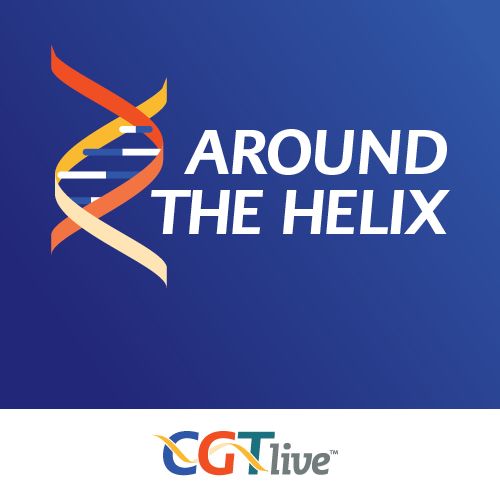Around the Helix: Cell and Gene Therapy Company Updates – February 21, 2024
Catch up on the latest news, breakthroughs, and announcements from biotechnology companies making advancements in cell and gene therapies.

The cell and gene therapy sectors are growing exponentially, with new players emerging daily and much progress being made both in and out of the lab. CGTLive™’s Around the Helix is your chance to catch up with the latest news in cell and gene therapies, including partnerships, pipeline updates, and more.
Have a cell and gene therapy news update you’d like to share with our editorial team? Tag us on social and use #AroundTheHelix!
1. FDA Greenlights Lifileucel for Unresectable, Metastatic Melanoma Via Accelerated Approval
The FDA has granted accelerated approval to Iovance Biotherapeutics for its tumor-derived autologous T cell immunotherapy lifileucel (branded now as Amtagvi) for the treatment of adult patients with unresectable or metastatic melanoma previously treated with a PD-1 blocking antibody, or treated with a BRAF inhibitor with or without a MEK inhibitor in the instance that the patient is if BRAF V600 positive.
2. European Commission Approves Exa-Cel for SCD and TDT
The European Commission has approved CRISPR Therapeutics and Vertex Pharma’s exagamglogene autotemcel (exa-cel; Casgevy) CRISPR-edited gene therapy for the treatment of patients who are 12 years of age and older with severe sickle cell disease (SCD) characterized by recurrent vaso-occlusive crises or transfusion-dependent beta thalassemia (TDT), for whom hematopoietic stem cell (HSC) transplantation is appropriate and a human leukocyte antigen matched related HSC donor is not available.
3. Sarepta’s Bid for Expanded Indication for DMD Gene Therapy Elevidys Now Under Priority Review by the FDA
The FDA has granted priority review to Sarepta Therapeutics’ efficacy supplement to its biologics license application (BLA) for delandistrogene moxeparvovec (marketed as Elevidys), a gene therapy for patients with Duchenne muscular dystrophy. The Prescription Drug User Fee Act date for the FDA’s decision on the supplement has been set for June 21, 2024.
4. IND Cleared for First RNA Exon Editor Therapy, Trial to Initiate in Stargardt Disease
The FDA has cleared Ascidian Therapeutics’ investigational new drug application for ACDN-01, permitting evaluation of the RNA exon editor therapy in a phase 1 trial in people with Stargardt disease.
5. Intellia and ReCode to Develop Gene Editing Therapy for Cystic Fibrosis
The collaboration brings together Intellia’s proprietary CRISPR-based gene editing platform with ReCode’s proprietary Selective Organ Targeting (SORT) lipid nanoparticle delivery platform to correct one or more cystic fibrosis (CF)-causing gene mutations.
6. Charles River to Source Human Pluripotent Stem Cells From Pluristyx
The cells, including high-quality embryonic stem cells (SCs) and induced pluripotent stem cells, will be distributed by Charles River for research use. Pluristyx's SCs are developed with the anCELLa™ platform including its proprietary FailSafe® safety-switch technology.
7. Wuxi to Manufacture Iovance's Approved Amtagvi
Amtagvi, also known as lifileucel, was approved on February 16 for unresectable or metastatic melanoma. The FDA has approved Wuxi's Philadelphia site to begin the analytical testing and manufacturing of Amtagvi for Iovance.
8. Tevogen Looks at Genetics to Determine Cell Therapy Potential in Long COVID
TVGN-489 is a cytotoxic T lymphocyte cell therapy that recognizes multiple protein targets across the SARS-CoV-2 genome. To inform a potential trial of the therapy in long covid, Tevogen will launch a preliminary study in Q1 2024 to assess whether the development of Long COVID is associated with particular Human Leukocyte Antigens (HLA) types.
9. Astellas and Kelonia Ink $800 Million CAR T Deal
The deal between Xyphos, a subsidiary of Astellas, and Kelonia, combines Kelonia's in vivo gene placement lentiviral technology and Xyphos' ACCEL platform that uses its convertibleCAR® (convertible Chimeric Antigen Receptor) platform on immune cells.
10. CU Anschutz to Launch Gene Therapy Trials for Dilated Cardiomyopathy
The trials, led by cardiologist Luisa Mestroni, MD, and geneticist Matthew Taylor, MD, PhD, at University of Colorado School of Medicine, are informed by findings from a patient genetic registry dating back to 1999 in the US.
Newsletter
Stay at the forefront of cutting-edge science with CGT—your direct line to expert insights, breakthrough data, and real-time coverage of the latest advancements in cell and gene therapy.